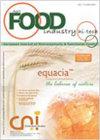Spelt Grain Use in the Technology of Grain Bread of Increased Nutritional Value
Q Engineering
引用次数: 0
Abstract
The range diversification of new generation products with increased nutritional value has been an urgent problem of the bakery industry for many years. The research aim is to develop technological solutions for the spelt grain “Runo” use in the bread technology of increased nutritional value with high quality indicators. The thesis presents a comparative analysis of the chemical composition of spelt Triticum dicoccum (Schrank.) Schuebl grain of the “Runo” variety grown in the Oryol region and soft wheat grain. The authors revealed the high content of proteins (14.5 %) in the spelt, characterized by a balanced amino acid composition, dietary fiber (5.2 %), minerals (2.1 %). They run the technological potential evaluation of spelt grain according to the raw gluten content and quality and the drops number. There were a slight decrease in the amount of raw gluten (by 1.0 %) and deterioration of its elastic properties (transition to the “unsatisfactorily weak” group) at the stage of grain preparation (soaking process). A man developed technological solu tions for the whole-grain bread production from spelt: suggested ascorbic acid solution (0.005 %) use to level out changes in the protein-proteinase complex of spelt grain during soaking; introduced soy lecithin in the aqueous fat emulsion form into the bread formula tion to improve the grain bread quality and preserve products freshness for a longer time. The researchers determined rational dosages of lecithin (0.5–1 % by grain weight), which introduction contributed to an increase in the grain bread porosity by 6 % and the specific volume by 5 % compared with the control.斯佩尔特谷物在提高营养价值谷物面包工艺中的应用
增加营养价值的新一代产品的品种多样化是烘焙行业多年来迫切需要解决的问题。研究的目的是为斯佩尔特谷物“Runo”在面包技术中的应用开发高营养价值和高品质指标的技术解决方案。本文对斯佩尔特小麦(Schrank.)的化学成分进行了比较分析。生长在奥廖尔地区的“Runo”品种的舒布尔谷物和软粒小麦。作者揭示了斯佩尔特的高含量蛋白质(14.5%),其特点是氨基酸组成平衡,膳食纤维(5.2%),矿物质(2.1%)。他们根据原面筋含量、质量和滴数对斯佩尔特谷物进行了技术潜力评价。在制粒阶段(浸泡过程),生面筋量略有减少(1.0%),其弹性性能下降(过渡到“不满意的弱”组)。有人开发了用斯佩尔特小麦生产全麦面包的技术解决方案:建议使用抗坏血酸溶液(0.005%)来平衡斯佩尔特小麦浸泡过程中蛋白质-蛋白酶复合物的变化;在面包配方中以脂肪水乳化形式引入大豆卵磷脂,提高谷物面包品质,延长产品保鲜时间。研究人员确定了卵磷脂的合理剂量(按粒重的0.5 - 1%),与对照相比,卵磷脂的引入使谷物面包的孔隙率增加了6%,比体积增加了5%。
本文章由计算机程序翻译,如有差异,请以英文原文为准。
求助全文
约1分钟内获得全文
求助全文

 求助内容:
求助内容: 应助结果提醒方式:
应助结果提醒方式:


